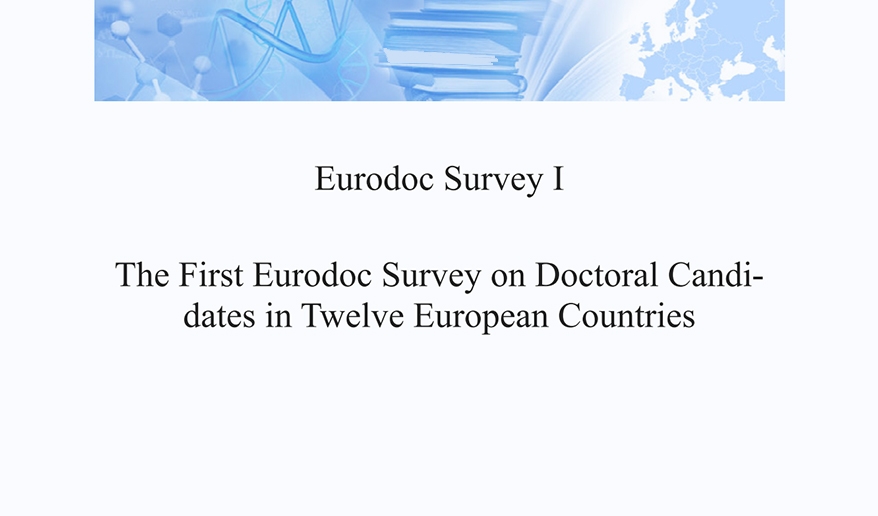
According to the Treaty of Lisbon, entered into force in 2009, research is a cornerstone of the knowledge society. In this sense, and in order to “take Europe into the 21 st century”, a special input is dedicated to the research area. Paradoxically, the information about doctoral candidates and junior researchers across Europe is clearly insufficient. Eurodoc proposes the first study about the situation of this social group at a European level. This survey, unique in its wideness, is an excellent means of identifying some important issues affecting doctoral candidates and junior researchers. The survey intends to deliver relevant information and trends in doctoral education, which can be used by institutional staff involved in the scientific career process as well as by policy makers both at European and at national levels.
Eurodoc Survey I was conducted in 2008/2009 throughout Europe. The final report analyses the current situation of more than 7500 doctoral candidates in twelve countries (Austria, Belgium, Croatia, Finland, France, Germany, the Netherlands, Norway, Portugal, Slovenia, Spain and Sweden). This study intends to answer to two main questions: a) what is the real situation concerning present employment, social benefits and working conditions of doctoral candidates and junior researchers; b) what are the differences regarding models of doctoral education across Europe. According to the survey, one can emphasize the following points:
- The large majority of the respondents reported to be between 26 and 35 years old. There are, in general more male than female respondents and they mainly research on science fields such as mathematics, physics and biology. Regarding family situations, most participants live in civil partnership and don’t have children. The exceptions are the Scandinavian countries.
- Concerning career path, one out of ten doctoral candidates obtained both their higher education degree and began their doctorate degree in their country of birth and two-thirds state having a full-time student status. High shares of fixed term contracts can be observed in nearly all countries, the exceptions being Portugal and Spain. More important, the vast majority of participants are not aware of the European Charter for Researchers or the Code of Conduct for the Recruitment of Researchers. As expected, most doctoral candidates look forward to be employed in the academic research sector.
- Regarding funding, one can highlight the clear fact that national funding systems are not adequate: a high proportion of doctoral candidates work on their research without receiving any funding. Although the doctoral research is the first step of a scientific career, funds received appear to be insufficient and not comparable to other professions at the same career level. As a direct result, family plans tend to be postponed.
- In what concerns training, most countries offer specialised guidance on the doctoral research subject. Depending on the country, these trainings (i.e. theory or methodology) can be mandatory or voluntary. However, training in fields such as, for instance, research ethics or transferable skills are insufficient or non-existent. Supervision is generally rated at a high level, the exception being Austria. The majority of the respondents state their supervisor’s role to be quite fulfilling. A disturbing fact is highlighted: over 20% of the participants stated they are not aware of the existence of a binding agreement between them and their supervisors defining each one’s obligations. This exposes, on one hand, a lack of knowledge on these matters from doctoral candidates, and on the other hand, a possible absence of university regulations in this domain.
- Although working conditions differ widely, one can state that most doctoral candidates have a time limit to achieve their doctorate degree and feel pressured to postpone having children. In other words, quite often social benefits are non-existing. Also, a relatively large proportion of the respondents do not have the right to use their own findings for other purposes than their doctorate. Strangely enough, not only women feel disadvantaged in academia because of their gender, but an even higher proportion of men declare to feel the same. One can therefore assume that this is a widespread feeling. Overall, the amount of publications is relatively low. However, doctoral candidates appear to be engaged in other types of activities, such as administrative tasks, teaching or even planning new research projects, while pursuing their degree.
- With reference to international mobility patterns, one can clearly observe a difference between EU countries and non EU-countries (i.e. Croatia). Indeed, participants from this nation have the lowest possibilities of travelling while undertaking their doctorate. Respondents’ main sources of funding for mobility are scholarships. As expected, the main reason to leave to another country is the desire to access better career prospects.
To conclude, it is important to draw attention to two important facts. Firstly, Eurodoc Survey I is intended to be a descriptive report rather than an interpretive study. Thus, the aim of this work is to provide as much information as possible from an objective and scientific standing. Secondly, it is important to stress that this work was achieved by volunteers from Eurodoc. This only highlights Eurodoc enthusiasm and motivation to work alongside with the EU
towards a better Europe.
Links to articles and news about Eurodoc Survey
Austria
- news.ORF.at, 10/11/2011
- derStandard.at, 31/10/2011
- DiePressen.com, 31/10/2011
- studiKURIER, 31/10/2011
- Nachrichten.at, 21/11/2011
- NÖN – Niederösterreichische Nachrichten, 31/10/2011
- Salzburger Nachrichten, 31/10/2011
- Studium.at, 31/10/2011
- Relevant.at, 31/10/2011
- Austria.com, 31/10/2011
The Netherlands
Portugal
- Universidade do Minho
- Universidade do Minho
- Diário Económico, 10/10/2011
- maisactual.pt, 02/10/2011
- CiênciaPT, 28/09/2011
- Lusa no Sapo, 28/09/2011
- Visão online, 28/09/2011
- Expresso online, 28/09/2011
- Diário do Minho, 29/09/2011
- Euraxess, Azores University
- (Antena Um, @ minute 24)
France
- Interview France24 (PART 1)
- Interview France24 (PART 2)
- Newsletter from L’Agence de mutualisation des universités et établissements
Eurodoc contact person: Julia Tomas
